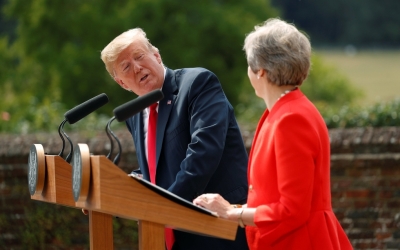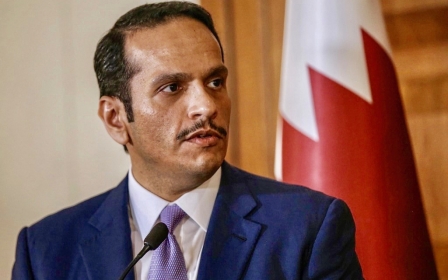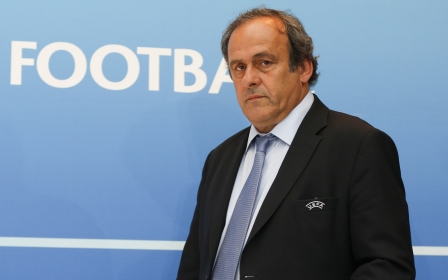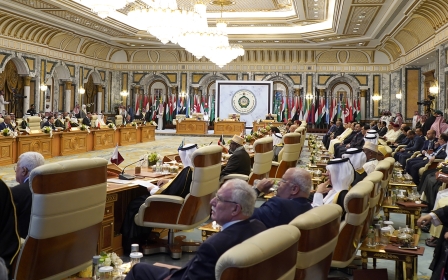Qatar blockade: Tillerson was left in dark as Kushner met with Saudis
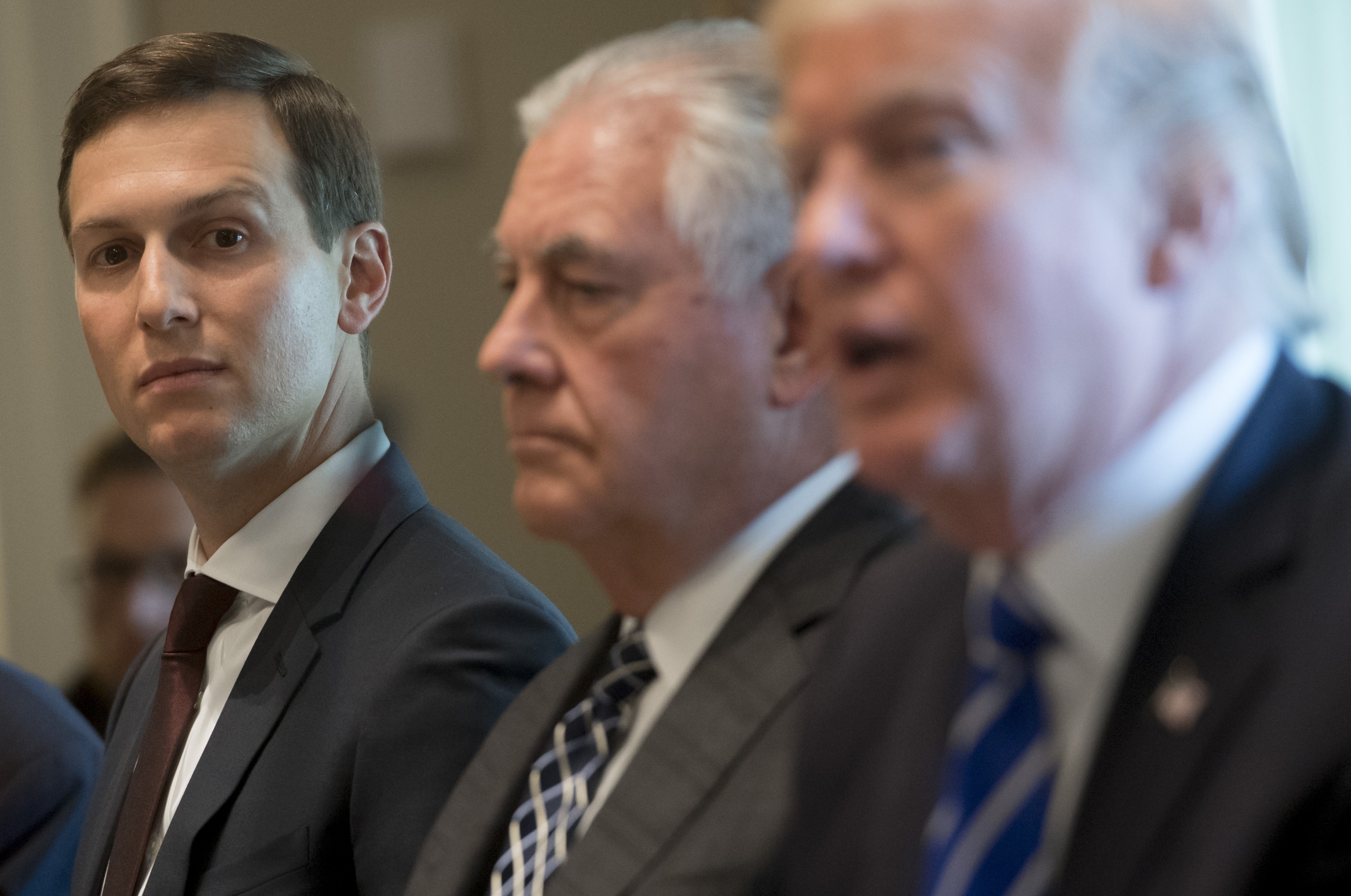
US President Donald Trump's son-in-law Jared Kushner had advance notice of Saudi Arabia's plan to impose a blockade on Qatar, but former secretary of state Rex Tillerson - Washington's top foreign policy chief at the time - was left in the dark.
In closed-door testimony to the House Foreign Affairs Committee in May, a redacted version of which was released on Thursday, Tillerson said he was "surprised" by news of the blockade in June 2017.
The move caught him and then-defense secretary James Mattis off-guard as they were visiting Australia, Tillerson told American lawmakers.
"Someone slipped me a message, and it just was a very short note to the effect about a blockade. And I slipped it to secretary Mattis," Tillerson said, describing how he found out about the crisis.
New MEE newsletter: Jerusalem Dispatch
Sign up to get the latest insights and analysis on Israel-Palestine, alongside Turkey Unpacked and other MEE newsletters
"And I think we waited for the next scheduled break and then we went out and made some calls to find out what was going on."
An interviewer identified in the transcript as a "Democratic counsel" told Tillerson during the congressional briefing that Kushner and then-Trump adviser Steve Bannon had been informed during a summit in Riyadh of several Gulf countries' plans to boycott Qatar.
According to the Democratic counsel's account, the conversation between Kushner, Bannon and the leaders of Saudi Arabia and the UAE took place during a "private dinner".
"Were you aware of that dinner?" the counsel asked.
"No," Tillerson replied.
"It makes me angry," said Tillerson, who was unceremoniously fired by Trump and replaced by Mike Pompeo last year, of being excluded from those discussions.
The blockade
In June 2017, Riyadh, Manama, Abu Dhabi and Cairo embarked on a coordinated campaign to isolate Doha, accusing the tiny Gulf nation of supporting terrorism - charges that Qatar denies.
Weeks before the four nations announced their blockade, Trump held a summit for regional leaders in Riyadh; it was his first foreign trip as president.
In October 2017, Bannon credited Trump's visit as being a catalyst for the Gulf crisis.
"I don’t think it's just by happenstance that two weeks after that summit, you saw the blockade by the United Arab Emirates and Bahrain, Egypt and the kingdom of Saudi Arabia on Qatar," Bannon said at the time.
But to Tillerson, the connection between the summit and the blockade was not clear.
Asked if he would have expected to be informed by Riyadh and its partners about the plans for the boycott, Tillerson said: "I would have hoped they would have."
"Certainly at the time, I think both secretary Mattis and I both felt, given the significant footprint of our Defense Department assets and my role, that someone would have called us and told us," he said.
Qatar is home to the largest US airbase in the Middle East. It also hosts the headquarters of US Central Command (CENTCOM), a joint centre for various branches of the US military operating in the region.
What unfolded after the boycott was announced was an astounding show of contradictions between the State Department, Pentagon and the White House.
Whereas Trump praised the blockade and accused Qatar as a "funder of terrorism at a very high level", Tillerson called for easing the boycott against Doha and the Department of Defense lauded Qatar for its "enduring commitment to regional security".
In his testimony to lawmakers, Tillerson highlighted his efforts to de-escalate the situation, particularly by urging Doha to refrain from retaliating against its neighbours.
The former secretary of state said he was not convinced by the claims that Qatar funds terrorism.
Tillerson also implied to lawmakers in May that a third party was forming Trump's perception that Doha assisted militant groups in the region.
"The statements [by Trump] around funding of terrorism, I do know what the origins of those were, and I can't comment on them for - because they're - I think they need to be protected," he said, according to the transcript.
Trump eventually reversed his views on Qatar, and last year he thanked Doha for its actions "to counter-terrorism and extremism in all forms". The US president is due to welcome Qatar's ruler Tamim bin Hamad al-Thani to Washington next month.
Kushner's role
Tillerson's statements to lawmakers make it clear that he was growing frustrated with Kushner's role in the administration.
He said in his testimony that Kushner thought the countries blockading Qatar had a "good reason to do what they were doing".
Trump's son-in-law serves as an adviser to the president, but he has also been tasked with putting together a peace plan for the Israeli-Palestinian conflict.
Moreover, has been acting as a representative of the US government in talks with several nations.
In 2017, the New York Times reported that Kushner played a major role in negotiations between the Saudis and US weapon manufacturers to iron out agreements worth more than $100bn.
In his testimony, Tillerson also recalled running into Kushner and Mexico's foreign secretary at a restaurant in Washington, when he did not even know that his Mexican counterpart was in town.
Tillerson told lawmakers in May that he confronted Kushner with his frustrations, but "not much changed."
"It's always challenging if everyone isn't kind of working from the same playbook," he said.
Tillerson, an ex-CEO of energy giant ExxonMobil, had no previous government experience when he was appointed secretary of state by Trump.
He left the administration in March of last year after a bumpy tenure amid several controversies, including reports that he once called the US president a "moron" after a cabinet meeting late in 2017.
Tillerson denied the story at the time and vouched for Trump's intelligence and patriotism, but earlier this year the president said his ex-top diplomat was "dumber than a rock".
Middle East Eye delivers independent and unrivalled coverage and analysis of the Middle East, North Africa and beyond. To learn more about republishing this content and the associated fees, please fill out this form. More about MEE can be found here.


